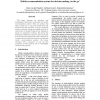Free Online Productivity Tools
i2Speak
i2Symbol
i2OCR
iTex2Img
iWeb2Print
iWeb2Shot
i2Type
iPdf2Split
iPdf2Merge
i2Bopomofo
i2Arabic
i2Style
i2Image
i2PDF
iLatex2Rtf
Sci2ools
ICMB
2005
IEEE
2005
IEEE
Mobile Recommendation Systems for Decision Making "On the Go"
This paper discusses the functional and technological opportunities associated with mobile recommendation systems. These are systems that help a mobile user or a group of mobile users with decisions that they encounter 'on the go.' Examples include consumers making purchasing decisions in retail stores, or students having ad hoc meetings to decide on assignment workload. We discuss key findings from behavioural decision theory to provide a set of functional requirements. This is followed by an exploration of technological options to implement mobile recommendation systems. The paper concludes with a discussion on how the user acceptance of these systems can be meaningfully measured and improved.
Related Content
| Added | 24 Jun 2010 |
| Updated | 24 Jun 2010 |
| Type | Conference |
| Year | 2005 |
| Where | ICMB |
| Authors | Hans van der Heijden, Gabriele Kotsis, Reinhard Kronsteiner |
Comments (0)

